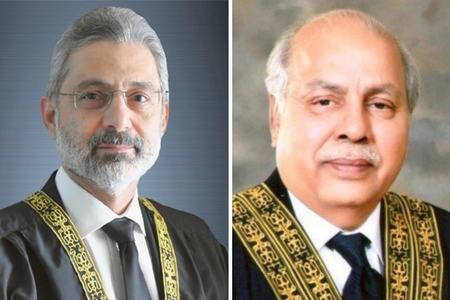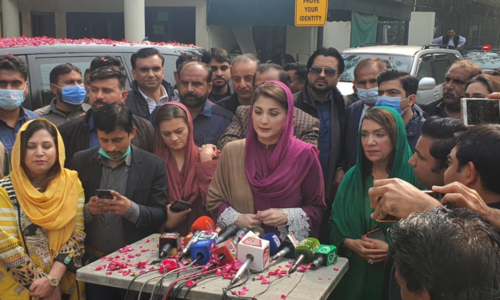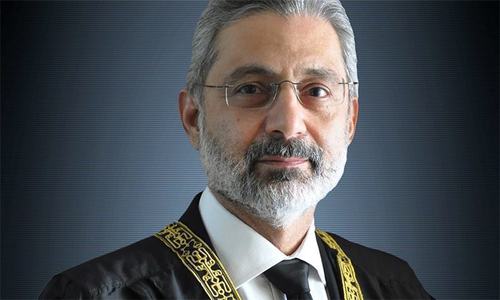• Writes to SC registrar, copies dispatched to all apex court judges
• Order bars him from hearing matters involving PM
ISLAMABAD: Justice Qazi Faez Isa on Saturday created quite a stir when he questioned why the Feb 11 order, in which he was barred from hearing matters involving Prime Minister Imran Khan, was not shared with him before releasing it to the media, terming the entire episode shocking.
In a one-page Feb 12 letter to Supreme Court’s Registrar Khawaja Daud Ahmed, on his letterhead, Justice Isa inquired why the order/judgement in the Rs500 million uplift funds distribution among PTI legislators case, was not sent to him and why the settled practice of sending it to the next senior judge was not followed.
The copies of the letter were also dispatched to Chief Justice of Pakistan Gulzar Ahmed and all the judges of the Supreme Court.
Justice Isa went on to question why was the order released to the media before he read it, let alone had the opportunity to sign it in agreement/disagreement and who ordered its release to the media.
Though the media went frantic with the development, an eerie silence descended soon after the letter was written to the registrar, pointing towards a brewing storm having the potential of getting ugly and tarnishing the image of the judiciary.
A number of senior counsel, when approached, preferred to watch the entire episode from the sidelines than openly commenting on the development. However, they somehow were united in saying that whatever was happening wasn’t good for the judiciary.
They believed that the Feb 11 order was the outcome of something that happened outside Courtroom No. 1 when the funds distribution case was disposed of.
They were also remembering the 1997 events when the entire country witnessed how the Supreme Court was divided into two with issuance of two separate cause lists, one under the directives of the then chief justice, Sajjad Ali Shah (late), and the other from the former chief justice, Saiduzzaman Siddiqui.
The then chief justice, Sajjad Ali Shah, however, had to succumb under the pressure when a 10-judge bench of the Supreme Court in the Malik Asad Ali case eventually removed Justice Shah after it ruled that it would be wrong and unjust to choose a junior judge and put him at the top as chief justice in violation of the principle of seniority which has to be followed strictly in case of appointment of the chief justice in accordance with the provisions of the Constitution and in consonance with the well-established constitutional conventions.
Likewise, when a three-judge bench headed by Justice Shah had suspended Constitution 13 amendment through which the president’s power to dissolve the National Assembly by invoking Article 58(2)(b) was clipped, a larger bench of the court instantly suspended the order of the minority order.
Meanwhile, the court roster issued for the week commencing from Feb 15 assigned only chamber work for Justice Isa, though five different benches had been constituted to hear a number of cases during the entire week.
In his letter, Justice Isa asked the Supreme Court registrar to provide him the case file so he may finally read the order/judgement.
“It is a normal practice that after the judgement is authored by a member of the bench in whichever case, the same was circulated to all the members of the bench to read and if some members of the bench intended to add or differ with the reasoning cited by the author judge, he issues his additional note or a dissenting note,” said a senior counsel who wished not to be named.
On Feb 11, Chief Justice of Pakistan Gulzar Ahmed, while hearing a five-judge bench, had issued an order requiring Justice Isa not to hear matters involving the prime minister, considering that he had already filed a petition against the prime minister in his personal capacity.
The order had stated that to uphold the principle of un-biasness and impartiality, it would be in the interest of justice that Justice Isa should not hear matters involving the prime minister.
The order had also recalled how Justice Isa during the hearing placed on record photocopies of certain documents stately received by him from some anonymous source through a WhatsApp message, the copies of which were also handed over to other members of the bench as well as Attorney General for Pakistan Khalid Jawed Khan.
Though Justice Isa had observed that he was unsure if the documents were genuine, the AGP had submitted that since the authenticity of the documents was questionable, the same may not be taken on record but in any event Justice Isa would become a complainant in the matter and in that capacity it would not be appropriate for the judge to hear the matter.
The chief justice, therefore, observed that in these circumstances it would not be proper for the judge to hear the matter.
In his letter, Justice Isa stated that he had learnt that an order/judgement (don’t know which one) was passed in the subject case on Feb 11 and released to the media.
“This is shocking since, as yet, I have not received the file with the order/judgement…,” the letter said, adding that “Honourable Justice Ijazul Ahsan apparently received it, but I never did and the world knows of it before I have seen it”.
A member of the Pakistan Bar Council, Munir Kakar, from Balochistan, however, described the ban on Justice Isa as violation of the 1989 Supreme Court judgement in which it was held that one set of judges of a constituted bench could not issue a directive to the other set of judges or any of the judges of the bench, not to hear a matter.
While dealing with the issue of bias, former judge Abdul Kadir Shaikh — a member of the-then 12-judge Supreme Court bench — had held that one judge of a division bench cannot direct other judges of the bench not to hear the case on the ground that he has a bias or an interest in the case or for that matter on any other ground whatsoever.
Justice Isa has always been in the media glare. Earlier he surprised many by writing letters to President Dr Arif Alvi with a request to provide the copy of the presidential reference instituted against him for allegedly acquiring properties in the United Kingdom in the name of his wife and children.
The reference, however, was quashed by a 10-judge Supreme Court bench on June 19, 2020 though it directed FBR to conduct its inquiry and then place its findings before the Supreme Judicial Council which may proceed against Justice Isa if they decided to.
On June 17, 2020, Justice Isa again created history when he entered Courtroom No. 1 as a messenger of Sarina Isa — his wife — to seek an audience for her via video link and satisfy the Supreme Court’s 10-judge bench about the source of the three-offshore properties in her and her children’s name.
Shocked, the Supreme Court then had reminded the petitioner — a sitting judge — that they had complete respect for him but it was not appropriate when the message could have been conveyed through his counsel, Muneer A. Malik, as the judge may be overcome by emotions.
Published in Dawn, February 14th, 2021














































